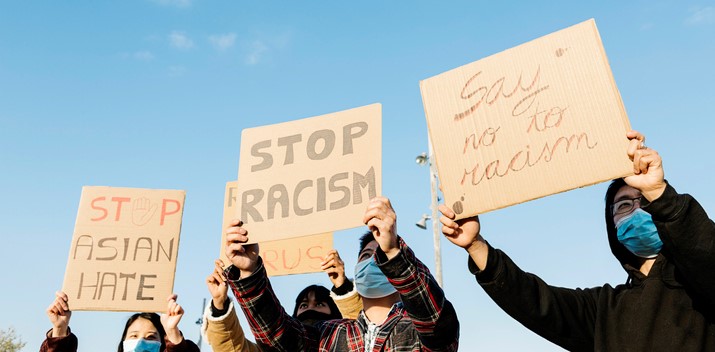Uplifting Mental Health Challenges and Resources in AA-NHPI Communities
By Seattle Foundation’s Asian American, Native Hawaiian, and Pacific Islander Collective
Seattle Foundation envisions a thriving region of shared prosperity, belonging, and justice, where all individuals and communities have equitable access and outcomes. Through our Blueprint for Impact, we recognize and address the longstanding racial and wealth inequities that have accelerated throughout the pandemic. This May, we uplift Asian American, Native Hawaiian, and Pacific Islander Heritage Month and Mental Health Awareness Month by shining a light on mental health challenges specific to the Asian American, Native Hawaiian, and Pacific Islander communities in our region.
For generations, Asian Americans, Native Hawaiians, and Pacific Islanders (AA-NHPI) have faced entrenched disparities, discrimination, and inequitable, systemic barriers while striving to reach true well-being. During the height of the COVID-19 pandemic, hate crimes against AA-NHPI-identifying individuals increased 150% across major U.S. cities – and in Seattle, Anti-Asian hate crimes increased 33% from 2019 to 2020. Racist rhetoric that erroneously connected Asians to the COVID-19 pandemic has been linked to increased hate crimes against these communities. Last year, Seattle Foundation condemned these atrocities and continues to mourn the tragic loss of life.
Not only have Asian American communities experienced an increase in hate crimes and violence, but they also face barriers to access support. According to Mental Health America, Asian Americans are the least likely racial group in the United States to seek mental health services. Much of this reluctance stems from the stigma associated with a mental illness, including the fear of being viewed as sick, weak, or lazy. Furthermore, talking about mental health in some Asian cultures is seen as taboo and mental illness is often associated with shame. These culturally specific historical perspectives have resulted in a lack of mental health awareness, education, and access to resources among many Asian Americans.
Seattle Foundation’s Asian American, Native Hawaiian, and Pacific Islander Collective is a staff affinity group that formed in the wake of anti-Asian hate crimes and the disproportionate impact of COVID-19 on AA-NHPI communities. It serves as a space for any staff identifying as Asian American, Native Hawaiian, and Pacific Islander to support each other, advocate for equitable practices and policies within Seattle Foundation, and work in solidarity with the Foundation’s other staff affinity groups. This month, the Collective recognizes the critical work of community-led organizations making a difference in AA-NHPI communities.
One of these organizations, API Chaya, is a nonprofit organization that works to empower survivors of gender-based violence and human trafficking. The organization serves immigrant communities, including those of South Asian, Asian, Pacific Islander, and Native Hawaiian descent. API Chaya works at the intersection of ethnicity, gender, and mental health, supporting the mental health of abuse survivors. It received a COVID-19 Response Fund Grant to support its mental and behavioral health work in 2020, as well as a 2021 Resilience Fund Grant from Seattle Foundation.
Priya Rai is an executive co-director of API Chaya. She explained that the organization connects individuals to culturally responsive services free of charge. This process entails referring people to staff and volunteers most familiar with their background, culture, and language. In 2021 API Chaya provided more than 700 survivors and their families with one-on-one advocacy and reached over 13,000 people with their comprehensive services.
“How can somebody truly be honest about what’s going on unless they can speak their own language?” Rai asked. “With API Chaya, participants are free to speak the language they were raised speaking. That makes a huge difference.”
Recently, the organization held its 2021 Annual Gala – giving voice to survivors and participants of API Chaya. In a taped interview presented during the Gala, Imani shared that they suffered from physical and emotional abuse in past relationships. Imani works with API Chaya through its RISE! program, addressing the needs of survivors of sexual violence, and the Queer Network Program, which offers a safe space for individuals who identify as Lesbian, Gay, Bisexual, Transgender, Queer, or Intersex, also known as LGBTQI. Through volunteering, Imani started their journey of recovery.
“Being in community with everyone at RISE! and the Queer Network Program has made me realize that I am more than the sum of my abusive relationships, that I am a person on my own,” Imani shared. “And that person is worth nurturing and celebrating.”
Shaila Kode spoke at API Chaya’s Annual Gala in 2020. In her video keynote, she explained how her arranged marriage led to her feeling isolated and led to physical and emotional abuse.
“My life was under [my husband’s] control, and I had nobody to talk to,” Kode shared. “The abusive behavior persisted throughout the bittersweet milestones of my adult life.”
Kode said she endured abuse throughout her multiple pregnancies. She was scared to leave her abusive husband due to the social stigma attached to divorce in Indian culture. Volunteers and staff at API Chaya helped her find the confidence to leave her life-threatening situation.
“Chaya was an emerging organization in 2000 while we lived through this ordeal,” Kode said. “I remember talking to anonymous counselors on how I should proceed. These guardian angels gave me the strength to keep moving forward, to overcome my denial and fear.”
API Chaya supported Kode as she navigated through the divorce proceedings. She says she gathered strength from the organization, her children, and her family to change her future.
“Today, I am a free soul, and I live life on my own terms, surrounded by my kids, my grandchildren, and my family. I am proud to be a part of the API Chaya family.”
Needs remain high as survivors navigate the pandemic. Learn more or to donate to API Chaya’s efforts.
Additional local organizations providing culturally responsive and linguistically accessible mental health and related resources for the Asian American, Native Hawaiian, and Pacific Islander communities in our region include:

